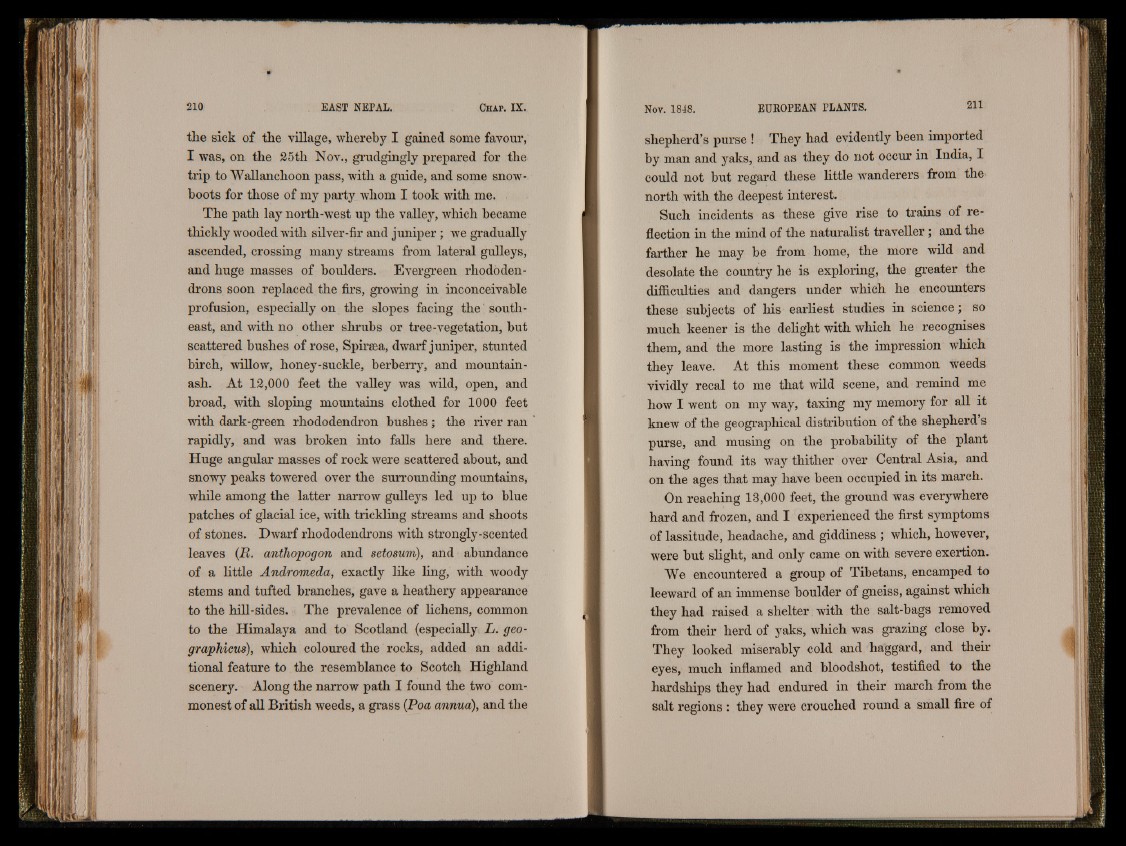
the sick of the village, whereby I gained some favour,
I was, on the 25th Nov., grudgingly prepared for the
trip to Wallanchoon pass, with a guide, and some snow-
boots for those of my party whom I took with me.
The path lay north-west up the valley, which became
thickly wooded with silver-fir and juniper ; we gradually
ascended, crossing many streams from lateral gulleys,
and huge masses of boulders. Evergreen rhododendrons
soon replaced the firs, growing in inconceivable
profusion, especially on the slopes facing the southeast,
and with no other shrubs or tree-vegetation, but
scattered bushes of rose, Spiræa, dwarf juniper, stunted
birch, willow, honey-suckle, berberry, and mountain-
ash. At 12,000 feet the valley was wild, open, and
broad, with sloping mountains clothed for 1000 feet
with dark-green rhododendron bushes ; the river ran
rapidly, and was broken into falls here and there.
Huge angular masses of rock were scattered about, and
snowy peaks towered over the surrounding mountains,
while among the latter narrow gulleys led up to blue
patches of glacial ice, with trickling streams and shoots
of stones. Dwarf rhododendrons with strongly-scented
leaves (B. anthopogon and setosum), and abundance
of a little Andromeda, exactly like ling, with woody
stems and tufted branches, gave a heathery appearance
to the hill-sides. The prevalence of lichens, common
to the Himalaya and to Scotland (especially L. geo-
graphicus), which coloured the rocks, added an additional
feature to the resemblance to Scotch Highland
scenery. Along the narrow path I found the two commonest
of all British weeds, a grass (Poa annua), and the
shepherd’s purse ! They had evidently been imported
by man and yaks, and as they do not occur in India, I
could not but regard these little wanderers from the
north with the deepest interest.
Such incidents as these give rise to trains of reflection
in the mind of the naturalist traveller; and the
farther he may be from home, the more wild and
desolate the country he is exploring, the greater the
difficulties and dangers under which he encounters
these subjects of his earliest studies in science; so
much keener is the delight with which he recognises
them, and the more lasting is the impression which
they leave. At this moment these common weeds
vividly recal to me that wild scene, and remind me
how I went on my way, taxing my memory for all it
knew of the geographical distribution of the shepherd’s
purse, and musing on the probability of the plant
having found its way thither over Central Asia, and
on the ages that may have been occupied in its march.
On reaching 13,000 feet, the ground was everywhere
hard and frozen, and I experienced the first symptoms
of lassitude, headache, and giddiness ; which, however,
were but slight, and only came on with severe exertion.
We encountered a group of Tibetans, encamped to
leeward of an immense boulder of gneiss, against which
they had raised a shelter with the salt-bags removed
from their herd of yaks, which was grazing close by.
They looked miserably cold and haggard, and their
eyes, much inflamed and bloodshot, testified to the
hardships they had endured in their march from the
salt regions : they were crouched round a small fire of